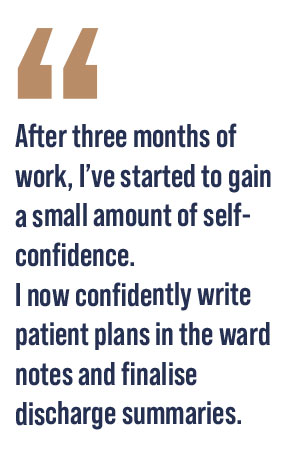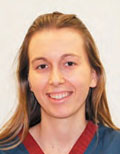

Blog

Intern Diary: Know your strengths and limitations
Tuesday July 20, 2021
I remember, as a final-year medical student, several lecturers saying something along the lines of “there isn’t much difference between now and next year except a piece of paper”. I listened, of course, but I didn’t give it much thought because there were exams looming and then summer holidays in between.
Now, having started my intern year, I see what they were getting at. It is certainly a change in both role and responsibility. My first week consisted of a series of realisations that I now had the authority to sign medical certificates, prescribe medications and contribute to clinical decision-making. No longer can I bring out the classic phrase: “Sorry, I’m a medical student”.
As a new junior doctor, one of the most noticeable changes in my role in the hospital is that I now have some autonomy to make and implement small decisions myself.

This was initially difficult. In my first few days, I found it unnerving to write ward round notes without a senior doctor co-signing them as when I was a student; in my first month I ran every charted medication or fluid order past a senior no matter if it was a strong antibiotic or simple analgesic.
After three months of work, I’ve started to gain a small amount of self-confidence. I now confidently write patient plans in the ward notes and finalise discharge summaries. I can prescribe fluids and basic medications independently in appropriate situations.
I admit I’ve had to work on this. I know I can’t seek constant reassurance and validation from seniors; I also need to back myself in situations where the decision is quite obviously at an intern-level.
But there is always a balance – we are often told the most important part of being a junior doctor is being safe and knowing when to ask for help. This is very true, and with every intern starting in a different placement throughout the spectrum of medical disciplines, we are all acquiring different knowledge and skills concurrently.
Starting my ED placement after three months of working in paediatrics, my current skillset is very different from my fellow interns coming from adult medicine placements. Whilst I would likely be more helpful than the average intern in a neonatal resuscitation and will happily examine a newborn or assess a dehydrated child, I am much less practised in reading ECGs or charting most medications other than antibiotics and analgesia.
Recently, I charted DVT prophylaxis for the first time – a job that many other interns would have done multiple times a week. Therefore, it was more important than ever for me to recognise my inexperience and raise this with my senior, asking them to check over my prescription. This highlighted to me the importance of knowing my strengths and limitations, especially as they may well be unknown to others.
As interns, we come into each rotation with a wealth of individual skills and knowledge from our unique experiences. For the more reticent of us, we need to recognise our strengths and have the self-confidence to act independently in appropriate situations.
However, more importantly, we aren’t always going to be prompted to initiate senior review; we need to be aware of our limitations and willing to ask for help when required. We are now medical professionals with all the responsibility that carries… but, like all doctors, we are very much still learning.

Dr Gemma Jongeling
Intern, St John of God Midland Hospital

